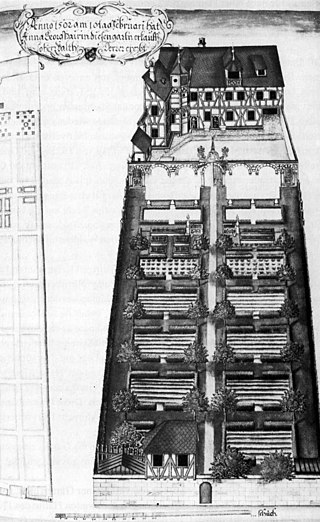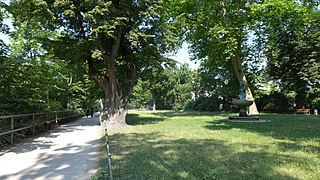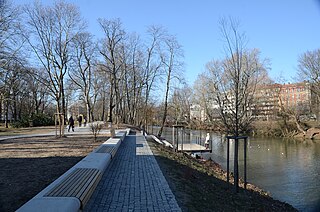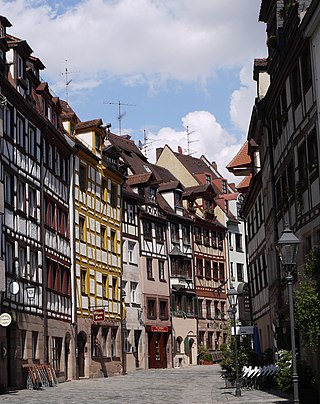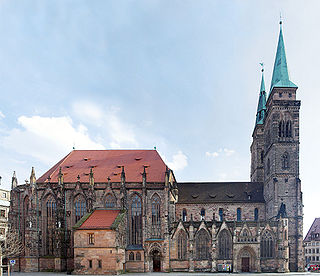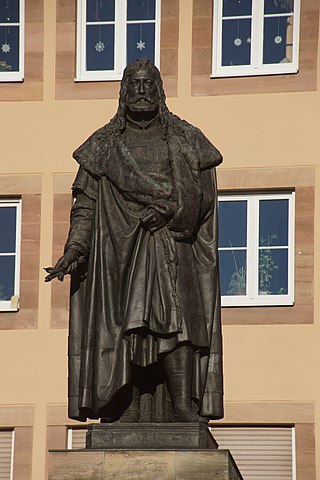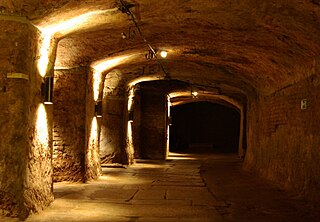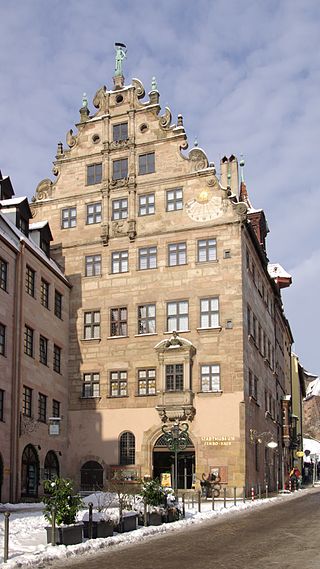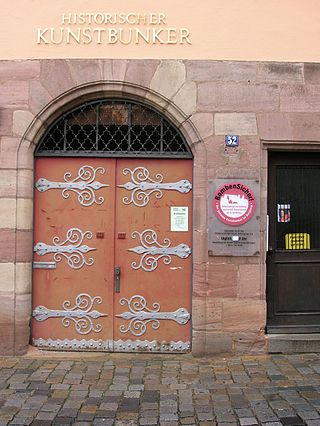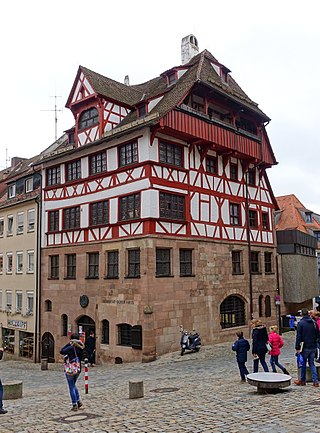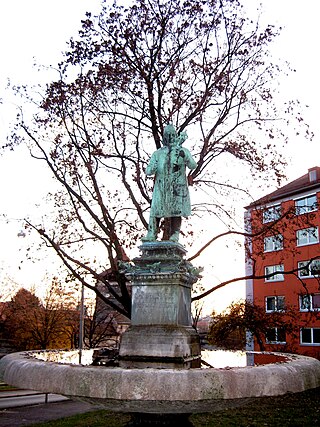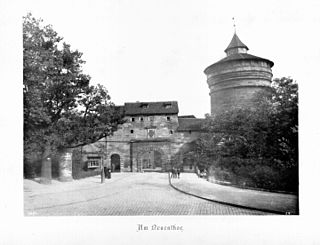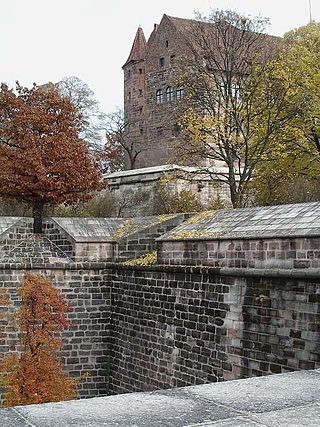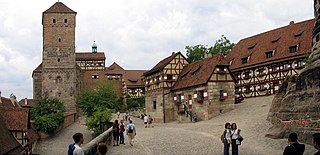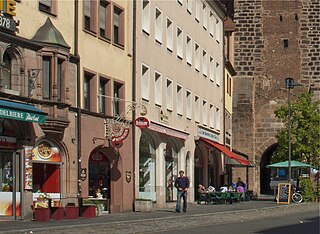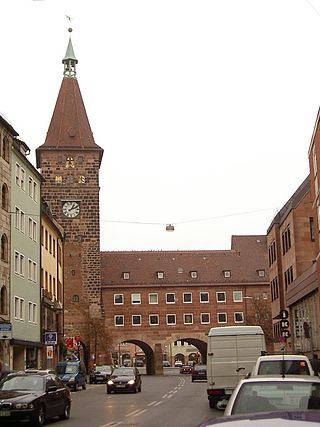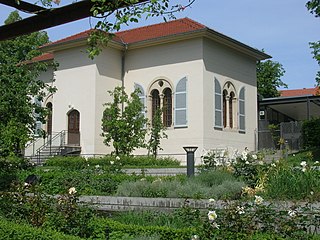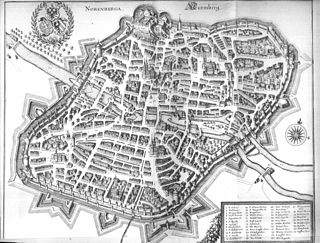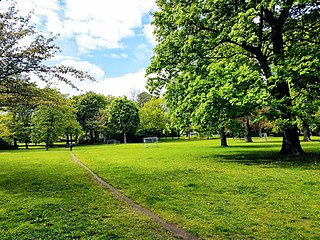Self-guided Sightseeing Tour #1 in Nuremberg, Germany
Legend
Guided Free Walking Tours
Book free guided walking tours in Nuremberg.
Guided Sightseeing Tours
Book guided sightseeing tours and activities in Nuremberg.
Tour Facts
6.1 km
158 m
Experience Nuremberg in Germany in a whole new way with our free self-guided sightseeing tour. This site not only offers you practical information and insider tips, but also a rich variety of activities and sights you shouldn't miss. Whether you love art and culture, want to explore historical sites or simply want to experience the vibrant atmosphere of a lively city - you'll find everything you need for your personal adventure here.
Activities in NurembergIndividual Sights in NurembergSight 1: Hesperidengärten
The hesperid gardens are several baroque gardens in the St. Johannis district of Nuremberg. They were part of a green belt along the city wall, which included 360 gardens used differently and formed the prerequisite for the development of a high -standing garden culture at the gates of the imperial city of Nuremberg. The creation of citrus plants was converted. The green areas were created by patrician families and merchants in the 16th, 17th and 18th centuries after the fruit, vegetable and herb gardens in the old town were gradually built on. The magnificent lust gardens separated the newly created suburbs from the old town. The city wall formed the physical border. In St. Johannis, wealthy citizens have lived since the early modern period who got a touch of Mediterranean culture into the home garden. The Nuremberg patricians and merchants oriented themselves to the model of the nobility in the garden design. Small ornamental gardens were built in the Renaissance and baroque style and equipped with a variety of wells and figures made of sandstone. In the elaborately designed gardens, there were valuable and exotic limon and pomerance collections.
Sight 2: Hallerwiese
The Hallerwiese is a 1.7 hectare park in the St. Johannis district of Nuremberg (Nuremberg). The Hallerwiese is located west of the Hallertor and thus outside the old town. It extends along the right bank of the Pegnitz between the Hallertor Bridge and the Großweidenmühlsteg. On the left side of the left bank of the river is the contempora garden. A foot and cycle path leads east through the Hallertürlein to the old town of Sebalder. Hallerwiese is also the name of district 070 in district 07 St. Johannis, but the area of which is not identical to the park.
Sight 3: Schnepperschützenbrunnen
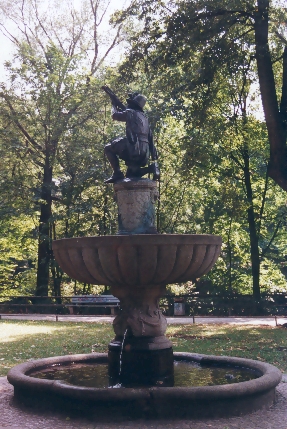
The Armbrustschützenbrunnen or Schnepperschützenbrunnen is located in Nuremberg, in the Hallerwiese green area in the St. Johannis district. Its installation in 1904 was made possible by a donation from the St. Johannis Civic Association, its creator was the Nuremberg sculptor Leonhard Herzog. Today, the fountain acts as the design centre of this oldest green space in the city and is one of the popular art and architectural monuments of the city of Nuremberg.
Sight 4: Kontumazgarten
The Kontumazgarten is a 1.7-hectare green space with a children's playground in the Kleinweidenmühle district of Nuremberg. The simple park is located in front of the Hallertor in the west of the old town, on the left bank of the Pegnitz between the Großweidenmühlsteg and the Hallertor Bridge. Opposite on the other bank of the river stretches the Hallerwiese. Kontumazgarten is also the name of district 054 in district 05 Himpfelshof, but its area is not identical with the green corridor.
Sight 5: Weißgerbergasse
Get Ticket*Weißgerbergasse is a street in Nuremberg, Germany. It is one of the few predominantly preserved architectural monument ensembles in Nuremberg's old town. It is lined with bars, restaurants and galleries.
Sight 6: Burgtheater
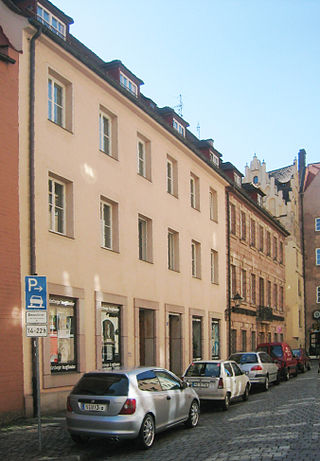
The Nuremberg Burgtheater is a theatre for cabaret, comedy and cabaret in Nuremberg.
Sight 7: St. Sebald Church
Get Ticket*St. Sebaldus Church is a medieval church in Nuremberg, Germany. Along with Frauenkirche and St. Lorenz, it is one of the most important churches of the city, and also one of the oldest. It is located at the Albrecht-Dürer-Platz, in front of the old city hall. It takes its name from Sebaldus, an 8th-century hermit and missionary and patron saint of Nuremberg. It has been a Lutheran parish church since the Reformation.
Sight 8: Albrecht-Dürer-Denkmal
The Albrecht Dürer Monument is a statue on Albrecht Dürer Square in Nuremberg, Germany. Created between 1837 and 1840 by the sculptor Christian Daniel Rauch, it depicts the German painter with brush, pen and laurel branch in his right hand. It is one of the most important works of classicist sculpture.
Sight 9: Historic Rock-cut Cellars
The rock passages are an extensive system of tunnels and cellars under Nuremberg's old town. Until the middle of the 17th century, the tunnel system in particular was secret.
Sight 10: Fembohaus
The Stadtmuseum Fembohaus is the city museum of the history of Nuremberg. 950 years of city history are vividly presented. It presents a comprehensive view of the city's history in a new museum atmosphere with ambitious exhibitions on current topics of the city's history. The museum is part of the network of museums of the city of Nuremberg.
Sight 11: Historischer Kunstbunker
The Historische Kunstbunker is a tunnel complex under Nuremberg Castle in the old city of Nuremberg, southern Germany. It forms part of the Nuremberg Historic Mile.
Sight 12: Albrecht Dürer's House
Get Ticket*Albrecht Dürer's House is a Nuremberg Fachwerkhaus that was the home of German Renaissance artist Albrecht Dürer from 1509 to his death in 1528. The House lies in the extreme north-west of Nuremberg's Altstadt, near the Kaiserburg section of the Nuremberg Castle and the Tiergärtnertor of Nuremberg's city walls.
Sight 13: Burgschmietbrunnen
The Burgschmietbrunnen fountain in Nuremberg stands on a small square at the junction of Burgschmietstraße and Neutorgraben. The fountain was built in memory of the sculptor and art caster Jacob Daniel Burgschmiet. The bronze figure depicting Burgschmiet was designed by the sculptor Fritz Zadow and cast by Ernst Lenz in 1897. The financing is provided by the residents of Burgschmietstraße.
Sight 14: Neutorturm
The Neutor is an old gate in the northwest of the Nuremberg city wall, located southwest of Nuremberg Castle.
Sight 15: Burggarten
Castle bastions are the name of the bastions built from 1538 onwards to the west and north of the castle in Nuremberg. The Nuremberg Burggarten is laid out in them.
Sight 16: Pilatushaus
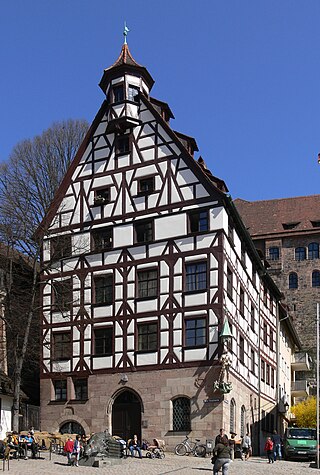
The Pilatushaus is a town house in Nuremberg, Germany. It is located in the northern district of St. Sebald below Nuremberg Castle on Tiergärtnertorplatz next to Tiergärtnertor. It is one of the few surviving town houses from the late Gothic period and is one of the most important architectural monuments in Nuremberg's old town. The house is a stop on the Nuremberg Historic Mile.
Sight 17: Imperial Castle
Get Ticket*Nuremberg Castle is a group of medieval fortified buildings on a sandstone ridge dominating the historical center of Nuremberg in Bavaria, Germany.
Sight 18: Deutsches Spielearchiv Nürnberg
The German Games Archive Nuremberg is an institution of the museums of the city of Nuremberg. The collection comprises around 30,000 board games, and the focus of the collection is on board and table games from the German-speaking world after 1945. The archive also sees itself as a scientific research institute that documents and evaluates the development of board and table games throughout the German-speaking world since 1945, as well as a promoter of the cultural asset of games in society.
Sight 19: St. Egidien
St Egidien on Egidienplatz is the former Benedictine Abbey of Saint Giles (Egidienskirche), now a church in the former free imperial city of Nuremberg, southern Germany. It is considered a significant contribution to the baroque church architecture of Middle Franconia.
Sight 20: Hutmuseum
The Hat Museum Nuremberg is a private museum in Nuremberg that deals with the production and properties of hats. It is located in a former hatter's workshop in Sebald's old town and is considered the smallest museum in Nuremberg.
Sight 21: Laufer Schlagturm
The Laufer Schlagturm is a gate tower of the penultimate city fortification of Nuremberg.
Sight 22: Landauerkapelle
The All Saints' Chapel in Nuremberg is a late Gothic sacred building. It was built between 1501 and 1510 as the house chapel of the Landauer Zwölfbrüderhaus according to plans by the Nuremberg architect Hans Beheim the Elder. It has been used by the Old Catholic parish in Nuremberg since 2006.
Sight 23: Hirsvogelsaal
The Hirsvogelsaal is an early Renaissance building in Hirschelgasse in Nuremberg. This is an extension of his Gothic residence carried out in 1534 by Lienhard III Hirschvogel, a Nuremberg long-distance trader. The reason for the construction was his marriage to Sabine Welser from Augsburg.
Sight 24: Tucherschloss

The Tucher Castle is a museum located at Hirschelgasse 9/11 in the St. Sebald district of Nuremberg's Old Town. The Tucher Castle was built as a city palace of the Nuremberg patrician Tucher family.
Sight 25: Laufer Torturm
The Laufer Tor was a gate in the northeast of the Nuremberg city wall. Today, the term refers to the road over the former city moat.
Sight 26: Cramer-Klett-Park
Cramer-Klett-Park is a small park in Nuremberg, Germany.
Share
How likely are you to recommend us?
Disclaimer Please be aware of your surroundings and do not enter private property. We are not liable for any damages that occur during the tours.
GPX-Download For navigation apps and GPS devices you can download the tour as a GPX file.
